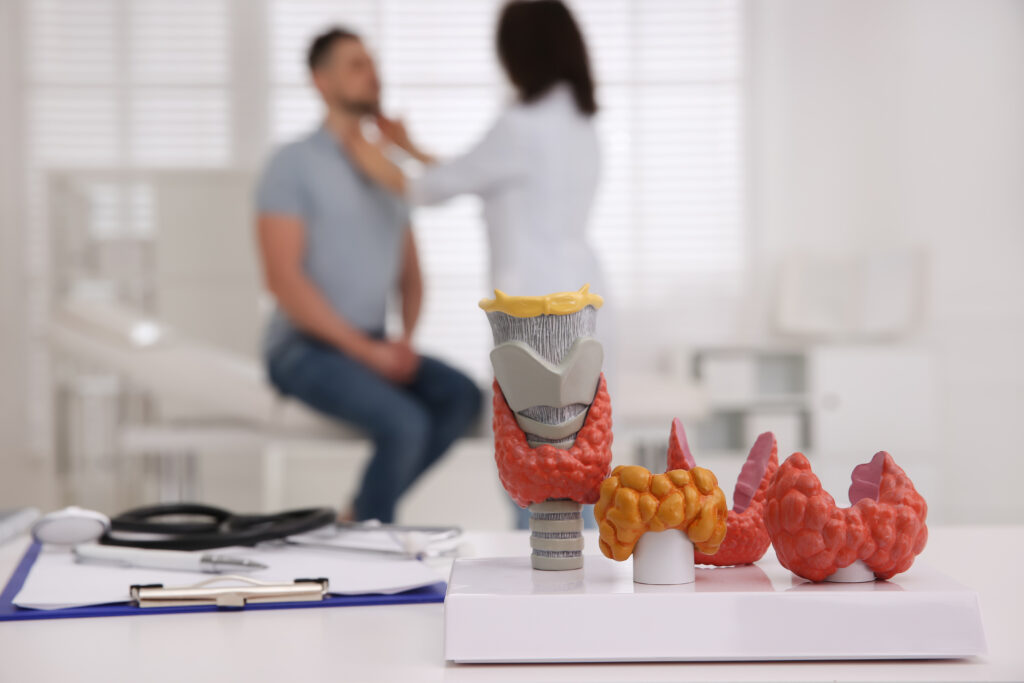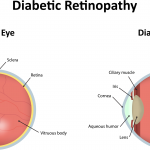March 20, 2023
10 Early Warning Signs of Thyroid Problems
Thyroid disease is a common condition, with as many as 20 million Americans living with various thyroid conditions.1 Most thyroid diseases can be managed with medication once they have been diagnosed. However, some people dismiss early symptoms of thyroid disease such as fatigue, weight changes, and hair loss because they don’t seem like a diagnosable condition on their own.
Learn more about the early signs of thyroid disease so you can get the treatment you need and start feeling better.
What Is the Thyroid?
Your thyroid is a butterfly-shaped gland that is located in your throat, wrapped around your windpipe.2  It’s part of your endocrine system, meaning that it’s an organ that produces hormones that control your metabolism, reproductive system, immune functions, and response to stress and mood.
It’s part of your endocrine system, meaning that it’s an organ that produces hormones that control your metabolism, reproductive system, immune functions, and response to stress and mood.
The thyroid produces hormones that control metabolism. This is the process by which your body converts food into energy. That energy is used for all your bodily functions, including digestion, cardiovascular functions, temperature regulation, skin, nail, and hair growth, and reproductive health. When your metabolism works properly, you have enough energy to maintain all of those functions.
If your thyroid doesn’t produce the right amount of hormones, your metabolism will be affected, and you’ll notice changes in how your body functions. This is known as thyroid disease. In some cases, the thyroid process too little hormone, so you don’t have sufficient energy for normal metabolic activity. In other cases, your thyroid might produce too much hormone, which speeds up your metabolism and leads to deregulation.
Ten Early Symptoms of Thyroid Disease
Thyroid disease can develop gradually and cause a wide variety of symptoms. Because thyroid hormones control metabolism, imbalances can affect your whole body. You may notice a wide array of symptoms that don’t seem to be related. They can all be caused by a slowdown or speed-up of your metabolism.
Certain telltale signs indicate a problem with your thyroid. Some of the most common symptoms of thyroid disease include:3,4
- Tiredness: Low thyroid function means your metabolic function slows down, and your body doesn’t convert food into all the energy you really need. You may find that you feel tired all the time or get tired more quickly than you used to.
- Sensitivity to cold: Reduced energy production can mean that your internal thermostat doesn’t go as high as it should, and your core body temperature is always low. You may find cool temperatures difficult to tolerate. You may also have trouble getting warm even when you move to a warmer room or add more layers of clothing.
- Weight gain: You may find that you’re gaining weight, even without changing your diet or exercise routine. This is because a core function of metabolism is to process food and convert it to energy. When that process slows, your body will convert the unused food to fat.
- Slowed heart rate: Bradycardia, or a slow heart rate, is a serious symptom of hypothyroidism. You may notice dizziness and breathing problems as a result of bradycardia. This can result in low blood pressure, fluctuating heart rhyme, and problems with your blood vessels. Untreated, it can cause long-term cardiovascular problems.
- Depression, memory problems, and difficulty concentrating: You may find that the lack of energy from hypothyroidism affects your mood. The lack of energy can make it hard to focus and difficult to remember things. This, alongside fatigue and other symptoms, can lead to feelings of depression.

- Losing weight without trying or increased hunger: When your thyroid is overactive, it signals your metabolism to speed up and produce more energy than your body needs. This can cause your body to release fat stores as fuel for this sustained need for energy. You may also feel hungrier than usual as your body uses up energy from food more quickly.
- Fast heartbeat or irregular heartbeat: Increases in thyroid hormone can speed up your heart rate or cause your heart system to fluctuate. This can put you at risk for severe complications such as stroke. You may also be at increased risk of congestive heart failure, where your heart cannot supply enough blood to the rest of your body.
- Nervousness, anxiety, and irritability: The excess energy your body is producing can have effects on your mood. You might feel jittery and unable to calm down. This may lead to nervousness and irritability that you can’t prevent or soothe.
- Enlarged thyroid gland: An overactive thyroid gland can swell. You may notice a lump in your neck, which is sometimes called a goiter.
- Sleep problems: Excess metabolic energy can make it difficult to fall asleep or stay asleep.
In addition, you may experience changes to major bodily functions, including:
- Digestion: Thyroid disease can speed up digestive processes, causing diarrhea and more frequent bowel movements. It can also slow digestion leading to constipation.
- Reproduction: Thyroid disease may change your menstrual periods. Periods can become less regular. They may also become unusually heavy.
- Skin, hair, and nails: Changes to hair, skin, and nails are common with thyroid disease. You may notice hair loss, thinning hair, or changes to hair texture. Dry skin and brittle nails are also caused by changes in thyroid function.
 How Thyroid Problems Are Diagnosed
How Thyroid Problems Are Diagnosed
If you suspect you are having problems with your thyroid, your doctor can order blood tests to check the levels of thyroid hormone in your body. The tests look at the levels of three different hormones: T-3, T-4, and thyroid-stimulating hormone.
A high level of T-4 and a low level of TSH is typical with hyperthyroidism. A high level of TSH and a low level of T-4 is typical of hypothyroidism.
If your doctor suspects hyperthyroidism, they may suggest additional testing for more inflation about how your thyroid is working and why it’s overactive. Additional tests may include:
- Radioiodine scan and uptake test: You’ll take a small dose of radioactive iodine, called radioiodine, to see how much collects in your thyroid. If a large amount of radioiodine is detected, that can confirm a diagnosis of hyperthyroidism. If a low amount of radioiodine collects in the thyroid, that indicates that thyroid hormones are leaking into the bloodstream, which indicates a type of thyroid disease called thyroiditis.
- Thyroid ultrasound: An ultrasound allows dictums to see the thyroid and look for nodules or growths on the gland. There’s no exposure to radiation with an ultrasound, so it can be an alternative test for people who can’t take radioiodine or who are pregnant or breastfeeding.
Causes of Thyroid Diseases
Hypothyroidism, or an under-active thyroid, occurs when your thyroid gland doesn’t make enough thyroid hormone.
Some of the causes of an under-active thyroid include:
- Thyroiditis: Swelling of the thyroid gland is called thyroiditis. The inflammation can reduce the amount of hormone your thyroid produces.
- Hashimoto’s thyroiditis: Hashimoto’s thyroiditis is an autoimmune condition. With Hashimoto’s, your immune system attacks and damages the thyroid, causing it to function poorly. This can be an inherited condition.
- Postpartum thyroiditis: About 5% to 9% of women experience swelling in the thyroid after pregnancy and childbirth. The condition usually goes away with time.
- Iodine deficiency: Iodine is a nutrient that the thyroid requires to produce hormones. If you do not consume sufficient iodine, your thyroid will not be able to work properly.
- A non-functioning thyroid gland: Some people are born with congenital thyroid deficiencies. Newborns are tested for thyroid function in the first weeks of life.
Hyperthyroidism, or an overactive thyroid, is what happens when your thyroid produces too much thyroid hormone. Hyperthyroidism causes your metabolism to speed up and produce more energy than your body needs. Some of the causes of an overactive thyroid include:
- Graves’ disease: This is a condition that causes the entire thyroid gland to be overactive and produce too much hormone. It is sometimes also called diffuse toxic goiter or an enlarged thyroid gland.
- Nodules: Overactive nodules within the thyroid can lead to hyperthyroidism. If a single nodule is overactive, it’s called an autonomously functioning thyroid nodule. If several nodules are affected, the condition is called toxic multi-nodular goiter.
- Thyroiditis: In some instances of thyroiditis, the thyroid releases hormones that were stored there due to inflammation. This can last for a few weeks or months. If the inflammation continues, it may cause the thyroid to slow down, leading to hypothyroidism.
- Excessive iodine: If you consume too much of the nutrient iodine, the thyroid makes more thyroid hormones than it needs. High levels of iodine can be found in some medications, such as certain heart medications and cough syrups.
How Thyroid Problems Are Treated
Thyroid disease is a manageable condition. The treatment you receive will depend on the type of thyroid disease you have.
- Thyroid replacement medication: Synthetic thyroid hormones are an effective treatment for an under-active thyroid. The medication replaces the thyroid hormone and reduces or eliminates symptoms.

- Anti-thyroid drugs (methimazole or propylthiouracil): Anti-thyroid medicines prevent your thyroid from producing excessive amounts of hormones.
- Radioactive iodine: Radioactive iodine damages the cells inside your thyroid, which limit the amount of hormone it can produce.
- Beta-blockers: Beta blockers are medications to control the symptoms of overactive thyroid without changing how the thyroid itself functions.
- Surgery: You may eventually need to have a thyroidectomy to remove the thyroid. This may happen if you no longer respond to medication. After your thyroid is removed, you will need to take thyroid replacement hormones for the rest of your life.
If you suspect you may have thyroid disease, talk to your doctor. They can help you diagnose and treat thyroid conditions.
References:
- “Thyroid Disease.” Cleveland Clinic. April 19, 2020. https://my.clevelandclinic.org/health/diseases/8541-thyroid-disease.
- “Anatomy of the Endocrine System.” Johns Hopkins Medicine. https://www.hopkinsmedicine.org/health/wellness-and-prevention/anatomy-of-the-endocrine-system
- “Hypothyroidism (Underactive Thyroid).” Mayo Clinic. December 10, 2022. https://www.mayoclinic.org/diseases-conditions/hypothyroidism/symptoms-causes/syc-20350284.
- “Hyperthyroidism (Overactive Thyroid).” Mayo Clinic. November 12, 2022. https://www.mayoclinic.org/diseases-conditions/hyperthyroidism/symptoms-causes/syc-20373659.
DISCLAIMER
The information featured in this site is general in nature. The site provides health information designed to complement your personal health management. It does not provide medical advice or health services and is not meant to replace professional advice or imply coverage of specific clinical services or products. The inclusion of links to other web sites does not imply any endorsement of the material on such websites.
Ready to become your healthiest self?
Get tips delivered to your e-mail inbox every month. Let’s get happier and healthier together!




